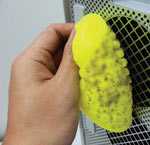
Sponge Blob
Alternately referred to as a "smart compound" and "cleaning goop," this viscous stuff is offered as the latest tool in keyboard germ warfare.
It has been seven and a half years since the University of
Arizona indelibly changed much of corporate
America's lunch habits by releasing its
landmark revelation that the average office desk
harbors 400 times more disease-causing microorganisms
than the average toilet seat. Even prior to
that skin-crawling announcement, though, Meinrad
Flury, CEO of the Switzerland-based Joker AG,
was busy in his laboratory trying to perfect a substance
that could clean and disinfect such tricky-todegrime
equipment as computer keyboards, mice,
and other components, which, as it turns out, are
bacterial hotbeds all.
What Flury came up with aft er 10 years of
development is an ectoplasm-like product now being marketed
in 51 countries — including, just since June, the United States —
as Cyber Clean®. Alternately referred to as a "smart compound"
and "cleaning goop," the viscous stuff Flury concocted is similar
in consistency to the soft , malleable molding substance called
Gak that was created and sold by Nickelodeon and Mattel in the
1990s and, for that matter, to Joker's own Swiss hit toy called
Slimy® and any number of other knock-off novelty items aimed
at the type of kids who delight in its ability to make faux "flatulence"
sounds simply by squishing the substance in its miniature
tub.
Cyber Clean, though, is no toy, stresses Alan Sutton, CEO
of Cyber Clean Americas, the Cherry Hill, N.J.-based company
that sells, markets, and distributes the product in the Americas
and Australia. While the compound has the same look and feel
of Slimy and like-minded products, Cyber Clean is designed as a
cleanser and, as such, is to be kept away from
children. That said, Sutton adds that the compound
is nevertheless still "fun" and easy to
use, off ering a better, safer way than the typical
use of compressed air to clean entrenched
surfaces such as keyboards.
"Before this product, there really was
no efficacious way to clean your keyboard,
computer, copy machine, hard drive, or
printer," Sutton says. "Cyber Clean is not a
gel, it's not a liquid, it's not a cloth, and it's
not a spray that just blows dirt and germs all
over the place and actually, at the end of the
day, spreads germs." Instead, it's a compound
made for pressing on to any surface, to which the substance
automatically molds itself and lift s out the dirt and dust, which
then becomes microencapsulated in the compound, preventing
the debris from migrating to the next surface.
"It actually traps the dirt and dust in the compound and disinfects
the surface on contact," Sutton says. "Physically, it is very
similar to the toy substances, but chemically it's totally diff erent.
The other stuff doesn't clean, whereas Cyber Clean takes care of
up to 99.99 percent of germs just by pressing it on and pulling it
off . There's no rubbing or scrubbing — you just press it on and
the dirt is gone. Plus, it has a pH of 7, so it's neutral
on the skin and is actually really soft and nice on
the hands."
Color-Coded Cleaning
Cyber Clean comes in foil packs, cups, or pop-up
tubs, and all these packaging varieties are resealable,
which is crucial for continued use. Because
the product's proprietary formula includes healthy
doses of both water and ethanol, it dries out readily
when left exposed. No matter what size product
is purchased, though, Sutton says the blob inside
can be re-used 75 to 100 times as long as it is
resealed.
When it's new, the compound is bright yellow, a color signifying
the substance's maximum absorption power. Over time, as
it absorbs more and more dirt and dust particles, the blob turns
dark green. Sutton says that once it turns that color, it's time to
throw out the product and start afresh, because while the stuff is
eco-friendly, being "green" with Cyber Clean is not a good thing.
"When it changes color, you can throw it on the ground or in the
garbage — it's biodegradable," he says.
According to Sutton, Cyber Clean is the first in a series
of "a whole range of smart compounds" from the company--
proprietary compounds that he hints could be used to conduct
electricity and sound, among other applications. Right now,
though, the only other Cyber Clean product available aside from
the Home & Office formulation is a slightly altered formula for
use in vehicles, suitable for being left in the extreme temperatures
encountered when left in car consoles in
summer and winter months, for example.
If you give Cyber Clean a try, no matter
which formulation you choose, be sure to occasionally
apply it to your telephone, because
according to that U of Arizona study, apart
from your desktop itself, one of the most
germ-ridden spots is that receiver you pick
up and hold to your face umpteen times each
day. To see the microencapsulation process
in action and get more details, go to www.cyberclean.tv.
This article originally appeared in the October 2009 issue of Occupational Health & Safety.